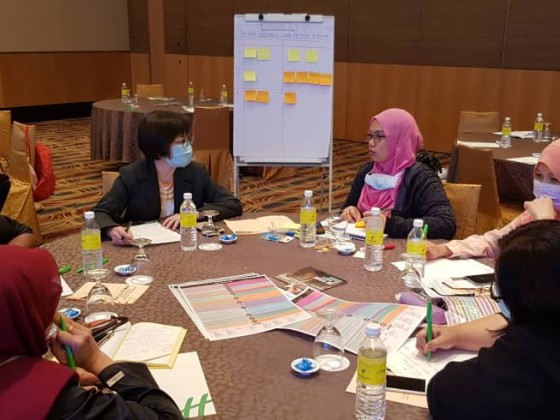President and CEO, Malaysian Industry-Government Group for High Technology (MIGHT)
To arrive at the ideal future envisioned by the nation, MIGHT President and CEO, Datuk Dr. Mohd Yusoff seeks to connect people and possibilities. To date, Datuk Yusoff has been largely successful in synthesising the power of innovation and cross-industry ties to elevate MIGHT as an extensively networked group of trend leaders.
With backing from numerous centres of excellence around the world, Datuk Yusoff’s current interests span developing a future-proof marketing framework to empower the high technology industry’s agenda.
In this edition, we recently caught up with Datuk Yusoff to explore how MIGHT’s incisive management and operations practice helps shape the latest technology, engineering and science trends. In addition, apart from untangling an increasingly complex world, this lends to local players’ growth through research and innovation by transforming fresh ideas into real-world solutions.
For Malaysia, the pandemic laid bare some pain points – that our supply chain while super connected is also highly vulnerable, our digital reach has yet to effectively meet the needs of the underserved segments of the population and that our food and border securities may not be as strong as we would like them to be.
Valuable lesson learned from the COVID19 pandemic
The COVID19 pandemic has resulted in a financial and humanitarian crisis of such scale and magnitude that even the most well prepared of us could not have anticipated. The pandemic which to date has infected almost 30 million people has resulted in the worst global recession on record since the World War II. In July 2020 the IMF predicted that global output will shrink by 4.9%, a downward revision from a 3.0% contraction earlier predicted in April.
For Malaysia, the pandemic laid bare some pain points – that our supply chain while super connected is also highly vulnerable, our digital reach has yet to effectively meet the needs of the underserved segments of the population and that our food and border securities may not be as strong as we would like them to be.
On the flip side, however, and if we play our cards right, COVID19 promises to be a great catalyst for a broad-based, rapid technology adoption in all economic sectors, and in this ‘new normal’ permeates almost every aspect of human life.
Government and Industries’ role and cooperation in boosting the economy
Managing the shocks and aftershocks from COVID19 particularly its socio-economic impact calls for the ability to think differently, being agile and being open to change to form close partnerships and collaborations with others.
Both the government and industries have long been aware of the benefits and catalytic effects of technology in elevating the Malaysian economy. Cross-cutting technologies such as artificial intelligence (AI), blockchain, and robotics were already on the path to rapid application and adoption. The challenge post-COVID19 however is one of acceleration. Organisations that do not prioritise digital transformation will quickly lose relevance.
Both sectors need to input into how to overcome legal and regulatory barriers that hamper economic advancement, and other ensuing matters such as resources and financing. The parties need to continuously engage the various members of the ecosystem which include not only the local players but also Multinationals (MNCs) and community-based organisations to ensure a more holistic approach.
On this note, both the public and private sectors should leverage on the strengths and experiences of MNCs in navigating the challenges brought about by COVID19. Many of them are cluster-based and bring about ecosystem benefits to their clusters. Working on strengthening the clusters opens up new opportunities and defensive strategies in facing industry challenges.
In engaging start-ups, the government, through MOSTI has launched the National Technology and Innovation Sandbox (NTIS) to nurture and facilitate the capability and capacity of technology start-ups. This effort is further enhanced by the Advanced Technology Cluster Programme which will connect the start-ups and their solutions and innovations with major industry players through a collaborative network approach.
An area of potential improvement is how the government can play a more active role, through collaboration with industries to improve the capability of semi-skilled and skilled workers through re-skilling and up-skilling programmes and engagements to open up new job opportunities.
Turning the current situation into new opportunities
The MCO restriction has forced people and businesses to rethink how they move forward. On the social side,
we are seeing a boom in non-physical contact services such as food delivery, online purchases, banking and online media communication. These are new opportunities in post-COVID19 time which were not significant pre-crisis.
An even larger scope is the nature and future of work itself. With greater use of technology and changes in the dynamics of the work place, an estimated 48 per cent of employees worldwide will work remotely at least part of the time post COVID19 as compared to 30 per cent before the pandemic.
Working from home (WFH) is now the new normal and is accepted by the society and has proven to improve productivity and costs in many organisations. It promotes work-life balance and opens up new opportunities to organisations that are not location dependent namely in the digital industries. The wide acceptance of WFH, coupled with the greater use of online engagement promises to improve government delivery in expediting efforts towards digitalising government services.
Another aspect of technology that merits further attention is telemedicine. Taking a leaf out of US’ experience and consumer adoption at the outset of COVID19, the number of consumers using telehealth rose from 11 percent in 2019 to 46 percent recently after the pandemic has skyrocketed. Replacing cancelled healthcare visits, the market potential presently stands at a quarter trillion dollar in a post- COVID19 scenario.
Malaysia has a proven track record in various aspects of medical sciences and services. We have already made considerable strides in the area of medical tourism and medical equipment and our medical services are among the best in the world. Malaysia is in good stead in terms of both capacity and capability as well as having enough demographic variations to develop the appropriate scenarios for telemedicine.
Across many levels, education has also been greatly affected both in Malaysia as well as globally. Again, this makes us all too aware of the fragility of the education delivery mechanism. At the height of the crisis, over 1.725 billion learners had either no access to education or were unable to attend schools or colleges worldwide. Once again, a business-as-usual proposition is neither desirable nor possible.
Developing an internet or cellular network-based delivery system seems to be the only viable hybrid solution in place of traditional face-to-face methods. This multi-faceted endeavour and its components include content development and delivery, platform infrastructure and learning management systems, among others. A private-public sector collaboration is key to the success of this effort.
In building social capital, we need to capitalise on the strengths of our digital natives and develop new sources of income for the country. Now, more than ever, Malaysia needs to embrace openness and agile new ways of doing things that will be a formidable trend in the digital economy to truly harness our strengths.









